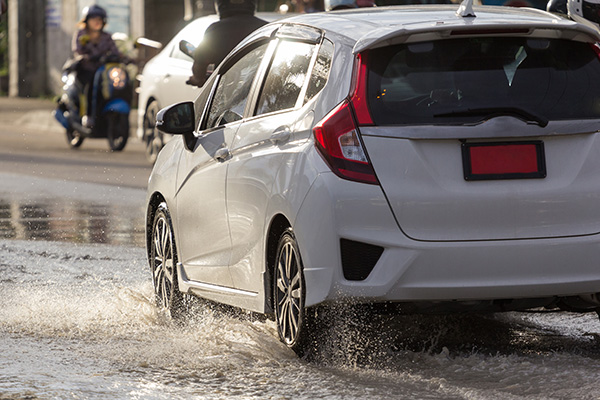
When roads are wet, even small problems with your tires can affect how well your car stops. Many drivers assume that as long as the tires aren’t bald, they’re safe. But tread depth starts to affect braking performance long before the tire reaches the legal minimum. As tread wears down, it becomes harder for your tires to push water out of the way. That can lead to longer stopping distances, reduced grip, and a higher chance of hydroplaning.
Your brakes may be in perfect condition, but if your tires can’t maintain traction, they won’t stop the vehicle as quickly as they should.
What Tread Does in Wet Conditions
Tread helps channel water away from the tire’s contact patch, which is the small area of rubber actually touching the pavement. When the grooves are deep enough, they allow the water to escape so the tire can stay in contact with the road. But when those grooves wear down, water has nowhere to go. It builds up under the tire and lifts it slightly off the road.
That loss of contact reduces your ability to steer, accelerate, or stop. The faster you're driving and the deeper the water on the road, the more important tread depth becomes.
Why Braking Distances Increase
When a tire can’t maintain full contact with the road, it takes more distance to bring your car to a stop. On dry pavement, the difference may not seem dramatic. But on wet roads, even one extra car length can mean the difference between stopping safely and hitting the vehicle in front of you.
The Legal Limit Isn't Always Safe
In most states, the legal minimum tread depth is 2/32 of an inch. But most experts recommend replacing tires at 4/32 of an inch if you drive regularly in wet conditions. The last few millimeters of tread wear down faster than people expect, and they also make the biggest difference in stopping power.
Tires that still meet legal requirements may already be underperforming in wet weather. Once tread reaches 4/32, braking ability begins to drop off more quickly. By the time you reach 2/32, the tire has little left to offer in terms of wet road safety.
Other Dangers from Low Tread
Stopping performance isn't the only issue. Shallow tread also affects how your car handles during turns, lane changes, or sudden maneuvers. Water can't move out of the way quickly, so the tire can slide instead of grip. That’s when hydroplaning becomes more likely.
Worn tires are also more likely to suffer damage. Thin tread makes it easier for sharp objects to puncture the tire. Small nails or debris that a healthy tire might shrug off can now cause a flat or a slow leak.
How to Check Your Tread at Home
You don’t need a special tool to check your tires. The penny test is a quick way to get a general idea of tread depth. Insert a penny into the tread groove with Lincoln's head facing down. If the top of his head is visible, your tread is 2/32 of an inch or less, and the tire needs to be replaced.
Some tires also include built-in wear bars that become flush with the tread when the tire is worn out. For the most accurate reading, a technician can measure the tread depth with a gauge and inspect the tire for uneven wear or other signs of trouble.
Why This Matters in Texas
Rain is common in Spring and Houston, TX, and wet roads are part of everyday driving. If your tires are already worn, every rainy day increases your risk. Slick intersections, wet highways, and standing water in low spots all challenge your tires to keep contact with the road.
You may not notice the difference in grip until you need to stop quickly or swerve. That’s when worn tread shows its weakness, often without warning.
Let Ripley's Total Car Care Keep You Safe in Wet Weather
If your tires are starting to look worn or you’re unsure about your tread depth, visit Ripley's Total Car Care in Spring and Houston, TX. We’ll check your tires, measure tread depth, and let you know if a replacement is needed. Good tires are one of the most important tools you have to stay safe in the rain. Schedule a tire inspection today and make sure your vehicle is ready for whatever the road brings.